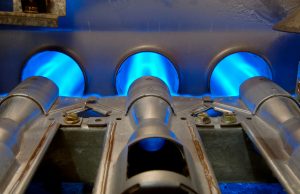 Winter is the time when our heating systems are put under more strained than ever, and when problems arise, they tend to do so just when cold weather hits and you need your system to function the most. It pays to keep a lookout for signs of trouble with your heating system, and call in a repair service the moment you spot one.
Winter is the time when our heating systems are put under more strained than ever, and when problems arise, they tend to do so just when cold weather hits and you need your system to function the most. It pays to keep a lookout for signs of trouble with your heating system, and call in a repair service the moment you spot one.
Few problems are bigger than a cracked heat exchanger, and if your forced-air furnace shows signs of it, then you likely need to get a new system installed. Doing so now means you’ll be able to enjoy a new heater all winter. What is a heat exchanger and why is it so important to your system? We’ve provided a brief explanation below.
How It Works
Forced-air gas furnaces rank among the most common types of heating system in the area. They rely on burners to provide heat, fed by natural gas piped into our homes from civic gas lines (or occasionally private sources). But the burners themselves aren’t particularly good at transferring the heat they generate into the air. They also generate toxic gases as a byproduct that need to be safely vented out of your home.
That’s where the heat exchanger comes in. It’s basically a piece of shaped metal that shifts the waste generated by the burners safely out of your home. In addition, as the burners ignite beneath it, their heat warms the metal which in turn will efficiently pass that heat onto the air above it. The heated air can then be blown through the ducts to warm your home.
What Happens When Something Goes Wrong
Heat exchangers are designed to last a long time, and because they lack moving parts, they don’t require repairs. But the process of heating up the metal then cooling it down when you turn off your heater, can take its toll over the years, and eventually cracks will develop. When that happens, the toxins are no longer being safely vented out of your home. It also means that the heat is not being efficiently distributed. At best, your heater has become monstrously inefficient. At worst, it presents an active health risk.
Modern furnaces usually have safety features that will automatically turn the heat off is they detect the flow of gas from the heater. (If your furnace doesn’t have such a feature, you should consider installing a detector nearby to alter you.) That’s actually good news, since it keeps your home safe and will instantly alert you to the problem. The bad news is you’ll need to get the issue addressed immediately if you want to use your heater again. In the case of a cracked heat exchanger, that usually means replacing the whole system. Check your warranty to see if it’s still in effect: that could have a huge impact on the cost. If it’s expired, then replacing the system if really the only viable option. A crack heat exchanger is nothing to fool with.
For Delaware heating replacement services, call Atlantic Refrigeration & Air Conditioning, Inc. today!
